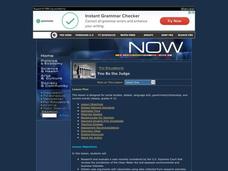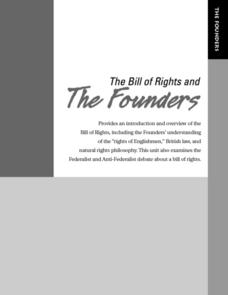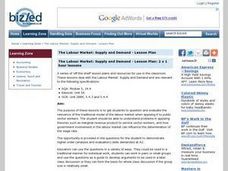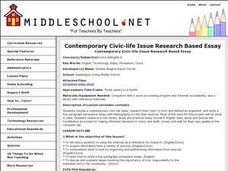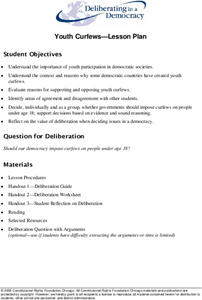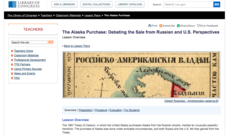Curated OER
You Be the Judge
Students research and evaluate a case considered by the U.S. Supreme Court regarding the jurisdiction of the Clean Water Act. They watch a Bill Moyers video, conduct a debate, and write about the decision they would make if they were a...
Curated OER
The Bill of Rights and the Founders
Students explain similarities between historical statements of rights and their modern applications, explore ideas of "Rights of Englishmen" and natural rights, discuss evolution of concept of rights and its impact on Bill of Rights,...
Curated OER
Constitutional Convention
Students engage in a role-playing situation to illustrate the kinds of compromised that were made a teh Constitutional Convention. They write three short 1-2 paragraph arguments and then present their arguments to the class at the...
Curated OER
Federalist 47
Students will analyze and evaluate political propaganda. In this lesson plan on the Federalist movement, students will examine the Federalist papers and analyze the Anti-Federalist argument mage against constitutional ratification. This...
Curated OER
Understanding Bias
Students participate in an interactive writing and discussion activity, on the study of bias, as it is used in political debate and decision making. They evaluate the presentation of material and its importance in making informed decisions.
Curated OER
The Labour Market: Supply and Demand
Students question and evaluate the relevance of the traditional model of the labour market and apply it to public sector workers. They investigate problem problems and apply theories such as marginal revenue product to service sector...
Curated OER
The Constitutional Convention: Four Founding Fathers You May Never Have Met
Middle schoolers read biographies of their assigned Founding Father. They present an oral argument that their assignee deserves to be better known by making connections between regional politics and postions defined by character.
Curated OER
Nation Building
Ninth graders examine the role of the United States in nation building. In this World History activity, 9th graders evaluate the role of the United States in building nations in other parts of the world.
Curated OER
The Path of the Black Death
Students are able to show on a map how the Black Death moved through Europe. They summarize the direct effects of the Black Death in Europe. Students cite evidence from firsthand accounts in developing an argument that connections can,...
Curated OER
Getting along With Others
Students examine character traits to find the most positive behaviors. For this getting along lesson, students identify behaviors that are beneficial to getting along. Students evaluate their own behaviors and target three that could...
Curated OER
Contemporary Civic-life Issue Research Based Essay
Seventh graders write a five paragraph persuasive essay on a contemporary civic-life issue.
Museum of the Moving Image
What Makes an Effective Ad?
As an introduction to a series of related resources that examine political advertising and commercials from 1952-2012, class members use the provided rubric to analyze and rate the effectiveness of the emotion, persuasion, factual...
East Lyme Public Schools
To Declare or Not to Declare Independence?
Class members adopt the persona of real figures in American history, Patriots and Loyalists, research these individuals to determine their stance, and then debate the question of whether or not to declare independence from England.
Deliberating in a Democracy
Youth Curfews
Don't stay out too late! Scholars analyze the need for youth curfews in a democratic society. They examine primary documents, case studies, and short video clips to form their opinions and take a position on the issue. Holding a class...
Library of Congress
The Alaska Purchase: Debating the Sale from Russian and U.S. Perspectives
Seward's Folly or brilliant strategic move? Class members investigate primary source documents from each country to determine the rationales behind the sale and purchase of Alaska, and then stage a debate.
Constitutional Rights Foundation
Unauthorized Immigration and the US Economy
As part of a study of immigration and the U.S. economy, class members assume the role of newspaper editors to determine which submitted letters to print on their paper's editorial page to present a balanced view of the debate.
Constitutional Rights Foundation
Guest-Worker Program
The U.S. Guest-Worker Program and the H-2A visa are the focus of a social studies activity. First, class members assume the role of advisors who must present the president with four proposals that would amend the visas given to...
NPR
The History of America’s Weed Laws
To understand the laws regarding marijuana use in the United States, you can go all the way back to the 1800's to learn about farming hemp, or you can go back to 2018 when California became the sixth state to legalize recreational...
C3 Teachers
Black Genius: How Did Black Genius Help Build American Democracy?
"How did the slavery system undermine the United States' democratic principles?" This question launches a study of how the Preamble to the Declaration of Independence, Article I, Section 2 of the U.S. Constitution, and Article IV,...
C3 Teachers
Reparations: Why Are Reparations Controversial?
To understand why the topic of reparations is controversial, young scholars gather background information by reading articles, watching videos, and examining cases where reparations were made. Learners consider the lasting repercussions...
Curated OER
The Student Cafateria as the "Leafy Chestnut Tree"
Students examine the difference between "news" of earlier periods, and "news" as we know it today. They then go out into the school common areas and analyze news from the perspective of word-of-mouth storys and discuss what they can...
Curated OER
social Studies: First Amendment Role-Play
Young scholars evaluate First Amendment case decisions by the Supreme Court. they divide into three groups - Supreme Court justices, prosecution attorneys, and defense lawyers. Both sides present their arguments and the justices...
Curated OER
Affirmative Action
Young scholars explore policies concerning affirmative action. After reading affirmative action handouts, students use the internet and other resources to research information about affirmative action laws, court cases, and arguments....
Curated OER
Voting and US Resident Aliens
Twelfth graders examine the process of voting. For this American Government lesson, 12th graders evaluate the arguments for and against alien voting. Students participate in a debate on voting rights.


